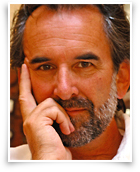
Richard Harvey
connecting psychotherapy and spiritual growth for human awakening
What Joseph Campbell Means to Me
I first ran into Joseph Campbell in a purely accidental manner. I was with a friend who had business with a community house in town. We were on our way to the country and stopped off.
While I waited for her I found myself in a scruffy, comfortable living-room. The walls were lined with books, many and various, the kind of ad hoc selection you come across in community houses. As my eyes scanned the books for a little distraction I happened upon four similar-looking volumes. The title of the series drew me instantly—The Masks of God.
I drew one of the volumes down and wedged myself in an armchair for the next fifteen minutes, transfixed. A thought (one echoed later by Joseph Campbell's advice to everyone to spend a year reading books) came to me very strongly—actually it was a passionate desire—to one day take some time out to devour and assimilate the knowledge and wisdom in The Masks of God.
The thought quietly and invisibly gestated inside me for some years until it was finally realized. Our life-changing events can be relatively unspectacular and it may be very hard to express the impact they make on our individual life. But as the subject of that life one counts off the stages and changes of life by significant events of a transforming nature. One such for me was following the decision to read all of Joseph Campbell's books.
I had become a successful psycho-spiritual psychotherapist. My practice, both individual and group, was burgeoning. In many ways I had reached the limits of my personal ambition. But with the success had come a certain jadedness. What had previously been overwhelmingly exciting and always surprising to me had somehow, somewhere along the line, degenerated into a routine of predictability, of contemplating the problems of human suffering, the details of which no longer seemed as unique and interesting to me as they once had. I had begun to feel that I had seen it all, dealt with it all and begun to identify deep themes of similarity in the human predicament—themes I didn’t understand.
So, reducing my practice drastically, I relocated to a remote rural cottage to engage once again in the practice where it had all begun for me—enquiry into myself. While I set about my task I allowed myself one great extravagance, a once-in-a-lifetime indulgence: I would read the collected works of Joseph Campbell and I would start with The Masks of God.
The scholarly nature of the books stretched my comprehension and conceptual structures, but I revelled in it. A hidden scholar in me began to take notes and think in new ways—something new was awakened inside me.
As the completist in me sought out more books, I came across the smaller, conversational works. The immense insights of books like The Mythic Image and The Hero with a Thousand Faces became grounded and supremely relevant to my evolving life and my therapy practice. But through books like An Open Life, The Power of Myth and, particularly (for its succinct and sharp insights) This Business of the Gods, I found a doorway into fresh and exciting insights into humanity, the context for life and its evolution.
Really, Joseph Campbell restored my faith in the mind, in writing and in books. He showed me that the written word could refer to more than itself; he revealed to me the transcendence of the literal, the meaning of symbolism and he opened a door through the world of appearances into the Mystery and Eternity itself.
Alongside this, he re-stimulated my interest in psychotherapy and in human beings. I began (beholden to his and others' influences) to formulate a spiritual map of my own which I published (in The Flight of Consciousness, Ashgrove 2002). Joseph Campbell's insights into the human condition constantly informed and deepened my understanding of the individuals who came to me for therapy and counselling.
Joseph Campbell appeared for me and many others I think synchronistically. He bridged the experiences of the early twentieth century with the more complex and sophisticated breakthroughs of the later twentieth-century. Like Jung, Krishnamurti, the Beatles or Wittgenstein, he was the right man at the right time.
It is a while now since I read any of the books or listened to any of the interviews. But it is a testament to the power of Joseph Campbell that I recall his words in situations where guidance and clarity are called for.
His enthusiasm, vitality and energy for myth and all that it signified communicated something timeless and resilient to me. Like a meeting with a genuine spiritual teacher, exposure to his mind, to his life, and to his insights were monumentally influential and life-changing. When Sri Krishna Menon told Joseph Campbell, “the way is to say yes,” it struck a great chord in me. For this I will always be grateful.
Share this article
This article was published in 2011 on The Conversation with a Thousand Faces section of Conversations of a Higher Order on jcf.org (viewable by free associate membership).